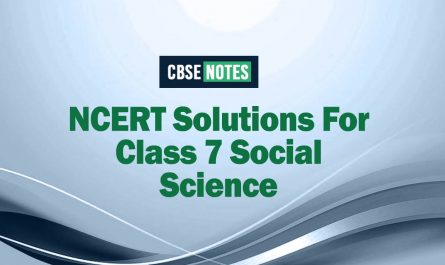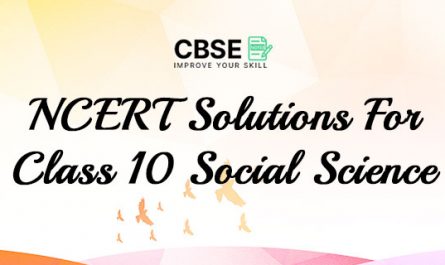Science is one of the most important subjects and holds a very distant place in the students’ life. Science has given the world some amazing innovations in the improvement of technology. Today what we are witnessing around us is modernization everywhere. We are going through developments that were impossible years ago.
At the school level, if the basics are made strong, it will be beneficial not only for the country but the world. Class 6 is usually considered a very primary stage at school but it is important to start sharpening the knowledge at an early age. NCERT Solutions for Class 6 Science is a good gateway to acquiring the best knowledge available. Here, we will discuss the chapter-wise details of class 6 Science.
Chapter-Wise Summary
Chapter 1 – Food: Where does it come from?
In this chapter, the students will learn some important topics related to food and its use. The students can learn food variety, food materials & sources, plant parts & animal products as food, plant parts as food, and what animals eat.
Chapter 2 – Components of Food
From this chapter, the students will know about the components of food. The chapter also consists of the introduction to the topics to food, introduction to nutrition, the components of food, the test to identify the protein, the test to identify fats, the test to identify carbohydrates, the test to identify starch, the role of specific nutrients, what is a balanced diet, and disease caused due to nutrient deficiency.
Chapter 3 – Fiber to Fabric
Natural fibers are obtained from plants and animals, for eg wool, cotton, silk, and jute whereas synthetic fibers like nylon and polyester are from chemical substances. This chapter speaks about the fibers and fabric, variety in fabrics, fiber, some plant fibers, spinning cotton yarn, yarn to fabric, and the history of clothing material.
Chapter 4 – Sorting Materials into Groups
The properties of any material are appearance, hardness, soluble or insoluble, float or sink, and transparency. This chapter teaches the students about the objects around us, the properties of materials, and many examples of different materials with different properties.
Chapter 5 – Separation of Substances
This chapter covers the methods of separation of substances. It includes hand-picking, winnowing, threshing, sieving, sedimentation, decantation, filtration, evaporation, use of more than one method of separation, and solubility in water.
Chapter 6 – Changes around Us
This chapter deals with the concept of physical and chemical changes. Students will get an idea of how things around them possess the property to change. They can do some experiments to carry out the changes around us. The chapter has three topics covered viz introduction to changes, are all the changes reversible, and could there be other ways to bring a change.
Chapter 7 – Getting to Know Plants
As we know, Earth is the only planet that has likely conditions for life to exist. This is because the two major things needed for life’s existence are water and oxygen. The ozone layer around Earth and the life of plants are also the most exclusive reasons behind it. In this chapter, the students will learn about herbs, shrubs & trees, stems, leaves, roots, and flowers which are the constituents of any plant.
Chapter 8 – Body Movements
In this chapter, the students will learn about the human body and its movements, socket and ball joints, pivotal joints, hinge joints, fixed joints, the gait of animals – Earthworm, snail, cockroach, fish, birds, how snakes move, and the movement of various animals.
Chapter 9 – The Living Organisms and Their Surroundings
In this chapter, the following topics are discussed; organisms and the surroundings where they live, habitat and adaption, a journey through different habitats, some aquatic habitats, characteristics of organisms, and living organisms and excretion. In this chapter, the students will learn about the habitat of plants and animals, and the probable existence of several types of plants and animals in the same environment. Adaption is the presence of certain traits and behaviors that allow plants and animals to live in a given ecosystem.
Chapter 10 – Motion and Measurement of Distance
This chapter covers important topics such as motion and measurement of distances, the story of transport, how wide is this desk, some measurements, standard units of measurements, correct measurement of length, measuring the length of a curved line, and moving things around us, and types of motion. The chapter also highlights the points –
Standard measures are those that are the same all over the world.
The 12th general conference on weight and measures in October 1960 adopted the International systems of units. “The System International Units” is the set of units that were established to maintain uniformity all over the world.
The standard unit of length is ‘meter’.
1 millimeter = 100 centimeters
1 centimeter = 10 millimeters
A Kilometer is a unit of length that is used for measuring large distances for which a meter is not a convenient unit. We define a larger used for measurement for long distances, 1 km = 1000 meters.
Chapter 11 – Light, Shadows, and Reflections
Light helps in see various objects around us. It is a form of energy. This chapter speaks about what are the sources of light – luminous & luminous, transparent, translucent, opaque, formation of shadows, various sizes of shadows, propagation of light – a beam of light & ray of light, and reflection of surfaces.
Chapter 12 – Electricity and Circuits
From this chapter, the students will understand the concept of electricity. The chapter contains important topics like electric cells, electricity & circuits, a bulb connected to an electric cell, an electric circuit, an electric switch, and electric conductors and insulators.
Chapter 13 – Fun with Magnets
The chapter fun with magnets will speak about the topics such as magnetic and non-magnetic materials, poles of a magnet, finding directions, making your own magnet, and attraction & repulsion between magnets.
Chapter 14 – Water
In this chapter, the students will understand the fundamental basics related to water. The term groundwater is explained in this chapter. The two extreme situations of water abundance and water shortage are mentioned as floods and drought respectively. It details the after-effect of drought and flood and the way they lead to loss of life and property. The topics included in this chapter are –
- How much water do we use?
- The water cycle, back to the oceans
- How can we conserve water?
- Where do we get water from?
- What if it rains heavily?
- Rainwater harvesting
- What happens if it does not rain for a long time?
Chapter 15 – Air around Us
In this chapter, the students will learn the composition of air (nitrogen 78% and oxygen 21%), essential gas for respiration, how air supports burning, air dissolves in water, cotton wool shrinks in water, the atmosphere & its constituents, green plants, and how plants & animals help each other in exchange of gases in the atmosphere.
Chapter 16 – Garbage In, Garbage Out
Our environment plays an important role in promoting physical and mental wellbeing; thereby untidiness and repulsion can damage their peace of mind. In this chapter, the students will understand the concept of garbage segregation from landfills. The following topics are covered in the chapter; what is garbage, types of waste, waste generation, waste segregation, landfill, recycling, biodegradable waste, non-biodegradable waste, plastics, and composting & vermicomposting.
Importance of Science: –
Class 6 Science is important and interesting to study because it explains the very basic things about modernization and technology. Learning Science must be a thing to be proud of. Science is the basis of knowing things around us. The land, water, soil, and even our living body are full of Science. Every single thing is scientific and with a purpose. The more you study the more you fill insufficient. Students possessing strong basics of Science will always have a bright future ahead of them.
When you learn Science more deeply you will understand what nature is and how things are made to live around us. Learning Science with heart in schooling days will surely be an advantage. In this process, NCERT Solutions for Class 6 Science will be the best guide you ever had.
Scope for Science
Any Science graduate or more than that will have a wide range of opportunities concerning jobs. To become a successful professional one must exhibit exclusive knowledge and this can be helped with the support of NCERT Solutions for Class 6 Science. Students can choose from many amazing career options and try to grow as exceptional professionals. Here are some of the best opportunities –
Data Science – It is the study of different kinds of data by applying scientific methods, algorithms, and processes. This is a new-age career option.
Software Designing – It is a highly creative field in need of a highly innovative mind. Software design help a lot of companies to help grow in their business.
Blockchain Developer – Since the evolution of Bitcoin in 2010, blockchain and its associates gained at their prime height. Blockchain is the technology of the future and a lot of young people are showing their interest in it.
Artificial Intelligence and Machine Learning – AI is the current and future trend and it plays a very important role in many fields. Machine Learning is also in great demand because of its innovative and exhilarating fields.
Business Analytics – A business analyst needs to study the trend of the data to predict the nature of variance. It is the study of highly structured data to bring favorable changes in the business.
Forensic Pathologist – Forensic field is the one where one has to study dead people. Forensic teams help police to crack the cases with specialization in forensic studies.
Spacetech – Space science is another interesting and attractive branch where youth would feel a challenging career.
Astrophysicist – It is the field of Science where principles of chemistry and physics are applied to study matters in outer space.
Geology – Those who are interested to know more about Earth, soils, rocks, and land can opt for this field. Geologists are scientists who specialize study of Earth and soil.
Technical Writer – Content creator and presenter of a particular subject. These people can write about Science-based matters for the people to understand better.
Amazing Things about Science
Science is amazing and there are a lot of things that many people are unaware of to date. Here we can see some of them below –
- It can rain diamonds on other planets.
- A cloud can weigh as much as around a million pounds.
- Bananas are radioactive.
- Bats don’t get sick from most viruses. (Remember Cov-19?)
- It is not possible to burp in space.
- Solar flares are very powerful equivalent to 100 megaton atomic bombs.
- Men are more likely to be color-blind than women.
- Soil is full of life.
Sources of NCERT Solutions
- Students can download NCERT Solutions for Class 6 Science PDFs from the official website of NCERT.
- Schools can help students to get these solutions.
- Students can avail of these solutions from a nearby bookstore.
- Students can refer to several educational websites on the internet and take down notes from them.
- They can purchase the solutions from the e-commerce websites available.
Conclusion
Studying Science will take you into an entirely different world. One could feel some things are magical but they are scientific. Science is a sea of knowledge that never ends and one can only grab a handful from it at a time. Parents’ role in developing interest in the mind of their children is very important and for that, they must show interest in teaching their children too.
NCERT Solutions for Class 6 Science will ensure the students are getting the best in the market. the study material, designed with various inputs on the answers, the notes, and the practice papers will let the students learn it hard way.
FAQs
What will the NCERT solutions include?
Major part of the solutions is well-described answers according to the syllabus. It is supported by notes, most probable questions, and practice test papers.
Why it is important to study Science?
A student who desires to get recognized in society must study Science because it is the answer to most questions that popped up in your mind as a kid.
Why do most students think Science is tough to study?
Lack of interest and conceptualization leads to loss of interest. If one learns the subject out of the syllabus box then it will not be a tough subject to learn.
Is it possible to get full marks in Science?
Yes, absolutely. Students who understand the basics well and learn by heart can definitely get full marks.
How many chapters are there in class 6 Science?
There are a total of 16 chapters for students to learn.
Why additional study with NCERT?
Textbooks can explain to the students the content whereas the NCERT Solutions for Class 6 Science will describe the answers in a flowing manner and easy to understand.




